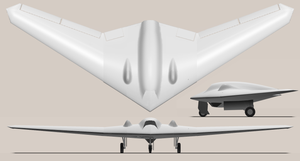WORLDWIDE CONQUEST: The U.S. Prepares for “Global Unmanned Warfare”

First of all, a network of special operation bases and the use of drones signify that the U.S. would be able to attack any adversary anywhere, not bothering too much about whether they are attacking a sovereign state or not.
Sources say that the U.S. plans to use such bases in Australia and in the Philippines, which reflects a new emphasis Washington is laying on confronting China along its eastern borders. With drones and special bases being deployed all over the globe and especially in the vicinity of such a sensitive area as the South China Sea, it gives the U.S. new opportunities to further alienate an unlimited number of nations.
As the U.S. Defense Secretary has been getting ready to present a new Pentagon budget for 2012, some details of his plans became known to the media.
One of the striking new features in the plan is that while the Pentagon is preparing to cut its conventional forces, it lays more emphasis on unmanned drones and special operation bases. According to some sources, the plan is to increase the fleet of unmanned aircraft by 30 percent in the coming years. Also, new, small so-called “lily-pad” bases will be deployed in various points of the globe for launching special operations and engaging allies.
Definitely, such plans reflect a growing weariness felt by the American public after the two wars in Afghanistan and Iraq which have claimed thousands of American lives. The number of civilian casualties among Iraqis and Afghans exceeds it by scores, but who cares?
Definitely, the majority of American taxpayers are no longer ready to pay for the deaths of their children. Unmanned aircraft seem a much more preferable tool for conducting warcraft. Again, it should be said that the use of drones does not significantly diminish the number of civilian casualties in the countries they are deployed in, but that again hardly bothers the U.S. public as well as authorities.
Therefore, from the elections point of view, the new plan might serve President Obama’s interests. But what could be its long-term implications?
First of all, a network of special operation bases and the use of drones signify that the U.S. would be able to attack any adversary anywhere, not bothering too much about whether they are attacking a sovereign state or not.
This has been done repeatedly in recent years. Drones were used over Somalia and Pakistan, with which the U.S. is not engaged in any war. The most notorious special operation launched by the U.S. last year on the territory of a sovereign state was the elimination of Osama bin Laden in Pakistan without even giving prior notice to Pakistani authorities.
It also sheds some light on the future of Afghanistan. Most probably, Obama (or whoever will be the White House host in 2014) will fulfill the promise to withdraw combat troops from there. But it will in no way mean that the operation is over. Instead of the stationary presence of regular troops, there will be small mobile units launching secret raids and hunt-and-kill missions.
With the expansion of the drone fleet and special operation bases, one should expect that the number of drone strikes and special forces raids will only increase. Formally, it would allow U.S. authorities to state that a) they are not launching any war against anybody, and b) they are sparing the lives of American soldiers. But in fact it would only be a continuation of the old belligerent policy.
But what would such practice result in? If we look back at Pakistan where the use of drones was most widespread, we can see that it not only inflicted enormous damage in terms of human lives and infrastructure, but also extremely alienated the Pakistani people from the U.S. and brought bilateral relations to the verge of total collapse. In fact, the Chinese were the only ones who were happy about the outcome, since it enabled them to tie Pakistan much closer to their strategic interests.
Sources say that the U.S. plans to use such bases in Australia and in the Philippines, which reflects a new emphasis Washington is laying on confronting China along its eastern borders. With drones and special bases being deployed all over the globe and especially in the vicinity of such a sensitive area as the South China Sea, it gives the U.S. new opportunities to further alienate an unlimited number of nations. So, the dilemma the present administration is facing is the following: is it worth risking further international isolation (which favors the U.S.’ global opponents and primarily China) for the sake of securing re-election for a second term?
Boris Volkhonsky is a senior research fellow of the Russian Institute for Strategic Studies
Stop NATO e-mail list home page with archives and search engine:
http://groups.yahoo.com/group/stopnato/messages
Stop NATO website and articles:
http://rickrozoff.wordpress.com
To subscribe for individual e-mails or the daily digest, unsubscribe, and otherwise change subscription status:
[email protected]

